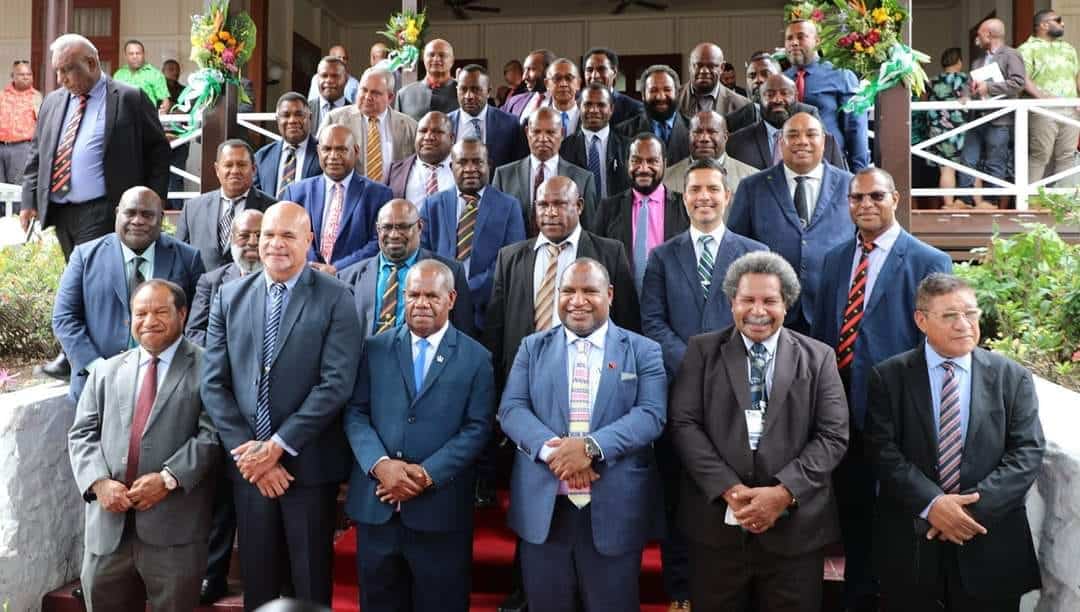Papua New Guinea Justice Minister and Attorney-General, Pila Niningi has brushed claims of a “split” in the coalition government, saying it is intact with the ruling Pangu Pati’s 53 MPs united.
“So much rumour floating around (on a division among the coalition partners). People should focus on their daily survival (instead),” he said.
“Disgruntled people can have secret meetings but this Government is solid. Pangu alone has 53 MPs. Its coalition partners such as the Social Democratic Party (SDP), United Resources Party (URP) and People’s First Party (PFP) among others are intact.”
Of the picture of him smiling beside former Prime Minister Peter O’Neill in Southern Highlands last week, Niningi said: “We are leaders, we shake hands and talk. Just because O’Neill and I were talking, doesn’t mean something is cooking.”
Also, last Thursday, 12 MPs from the Southern Region reaffirmed their support for Prime Minister James Marape as the 18-month grace period will end on 09 February, allowing for a motion of no-confidence in the Government to be moved.
The 12 MPs are:
WESTERN – Toboi Awi Yoto (Governor), Seki Agisa (South Fly) and Agena Gamai (Delta Fly);
GULF – Sir Chris Haiveta (Governor), Soroi Marepo Eoe (Kikori), Thomas Opa (Kerema);
CENTRAL – Casmiro Aia (Goilala), Sir Ano Pala (Rigo);
NCD – Lohia Boe Samuel (Moresby North West), John Kaupa (Moresby North East);
MILNE Bay – Henry Leonard lsi (Samarai Murua), Jimmy Maladina (Esa’aala).
They said in a statement that they planned to continue the journey they started after winning the 2022 General Election with the Marape-led Government.
Meanwhile, the Registry of Political Parties registrar Emmanuel Pok said the Pangu Party led by Marape had 52 MPs, United Resource Party led by State Enterprise Minister William Duma had 14 MPs, and the People’s National Congress Party led by Peter O’Neill 11 MPs.
NCD Governor Powes Parkop’s Social Democratic Party has six MPs, Trade Minister Richard Maru’s People First Party has four and Sir Peter Ipatas Peoples Party also has four MPs.
Bulolo MP Sam Basil Jnr has three MPs, Walter Schnaubelt’s National Alliance Party has two, Belden Namah’s PNG Party has two, and Kerenga Kua’s PNG National Party also has two.
Pok said the People’s Progress Party, Liberal Party, Peoples’ Reform Party, PNG Destiny Party, PNG Greens Party, Melanesian Alliance Party, Our Development Party and the Melanesian Liberal party all had one MP each.
MPs who remain as Independent candidates are East New Britain Governor Michael Marum, East Sepik Governor Allan Bird, Chimbu Governor Noah Kool and Kagua Erave MP Maino Pano.
“This is the update list as of 02 January, this year. We always update our list on a monthly basis,” he said.
Pok also confirmed that they have received notice from MPs stating they were resigning from the government but none had resigned from their respective parties.
In another development, SINASINA-YONGOMUGL MP Kerenga Kua tendered his resignation as Energy Minister to Prime Minister James Marape on Thursday, giving five reason why he had to leave.
Marape thanked Kua, following his resignation, for his dedication and service as Petroleum and Energy Minister in the past five years
In a Cabinet reshuffle the previous Thursday, Marape had halved the Petroleum and Energy Ministry, and offered Petroleum to his party man, Esa’ala MP Jimmy Maladina.
Flanked by Abau MP Sir Puka Temu, Chuave MP James Nomane, Hiri-Kairuku MP Keith Iduhu and his PNG National Party executives, Kua announced his resignation on Friday at his Dream Inn Motel.
He said the reasons for his resignation were:
*A STEADY decline in the standard and productivity of leadership and governance;
*A CULTURE of praise and worship in Government;
*WEAPONISATION of the budget;
*CRONYISM and nepotism in jobs allocation; and
* A THREAT to many important projects in the hydrocarbon industry which were nearing the critical decision stage with his removal as minister for petroleum in the latest reshuffle.
“Minimum leadership standards and expectations have been eroded considerably,” Kua said.
“It seemed any leader could do anything with impunity and get away with it.
“However, if leaders at the bureaucratic levels did anything wrong, then the political leadership applied the minimum standards and came down very hard on them.”
Kua added that the decision to resign was not easy.
He said it was made harder by the fact that he was only one of three from the Opposition who was invited to Cabinet in 2019 by Marape, and who was retained in his Petroleum and Energy portfolio after the 2022 General Election.
Kua added: “Prime Minister Marape, in his wisdom, appointed me as Minister for Petroleum from the Opposition. And that is unprecedented, I think, in many places.
That was an exceptional leadership call that he made.
“And I felt duty-bound to go beyond the call of duty to do more than any other minister to reforming the petroleum industry. And that is what I did.”
He said the petroleum industry was the single biggest revenue generator. And it comes with a lot of sensitivities too.
“I felt I was not entitled to the job but somebody entrusted me to do the job.
“So I had to do it with due care and attention.”
He added that an example of the weaponisation of the budget was that financial resources were allocated to political loyalists rather than to projects which could benefit the people.
“Some departments don’t receive much notwithstanding the important roles they play.
“Financial allocations to provinces are uneven and unfair.
There are no identifiable criteria to enable fair distribution. Provinces like Eastern Highlands, Simbu and Jiwaka are always treated unfairly.”
He also claimed that the distribution of senior jobs was along political loyalty and nepotism which had taken deep roots.
He feared that all the work he had overseen over 10 years, in or out of Cabinet, were in serious jeopardy. Sir Puka, Nomane and Iduhu who had resigned from Government earlier, welcomed Kua’s resignation, and agreed that Government and governance had deteriorated much under the leadership of Marape.
